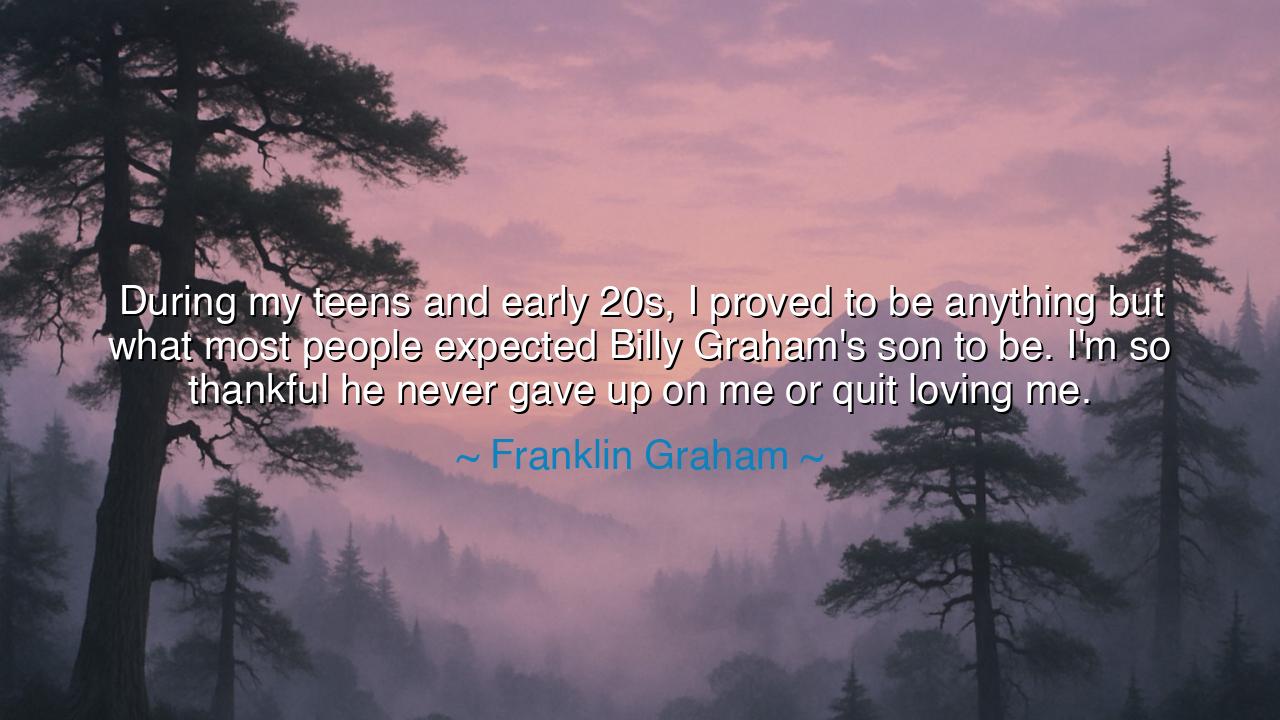
During my teens and early 20s, I proved to be anything but what
During my teens and early 20s, I proved to be anything but what most people expected Billy Graham's son to be. I'm so thankful he never gave up on me or quit loving me.






Hear the words of Franklin Graham: “During my teens and early 20s, I proved to be anything but what most people expected Billy Graham's son to be. I'm so thankful he never gave up on me or quit loving me.” These words carry the weight of rebellion, failure, and redemption. They speak to the wandering path of youth, and the steadfast love of a father who did not turn away. Within them lies a lesson not only for families, but for all who stumble and rise again—the truth that love, when unyielding, has the power to restore what is broken.
The origin of this reflection lies in the shadow of great expectation. Franklin Graham was the son of Billy Graham, a name revered across nations, a man considered a shepherd to multitudes. To be born under such a light is both a blessing and a burden. The world expects perfection, but youth often stumbles. Franklin himself confesses that he was “anything but” the ideal many assumed he would be. Yet, in his defiance, in his failings, the unchanging love of his father became his anchor.
History is rich with stories of children who lost their way, only to be restored by patience and mercy. Consider the ancient parable of the Prodigal Son, who squandered his inheritance in reckless living and returned home in shame. Yet his father did not meet him with scorn, but with open arms, rejoicing that his son was alive and had come back. Franklin Graham’s words are a modern echo of this timeless truth: that the deepest power of love lies not in preventing failure, but in embracing the fallen and lifting them again.
What shines brightest here is the power of steadfast love. Franklin admits that he did not live up to expectations. Yet he gives thanks—thankful that his father never quit loving him. This is a teaching for all generations: that love must not be conditional upon perfection. For perfection is rare, but love that endures through imperfection is divine. Such love does not demand worthiness—it creates it.
This wisdom also speaks to the reality of struggle in youth. Many who are young falter, chasing desires, resisting the weight of expectation, and wandering into darkness. Yet the story does not end there. When someone believes in us, when someone’s love does not die, we are given the strength to rise again. Franklin’s life, transformed by the faith and patience of his father, teaches that even the most wayward soul can find purpose if given the chance to return.
What lesson, then, must we take? That we must never give up on those who falter, especially those entrusted to our care. Parents, mentors, friends—all must remember that their love has the power to restore. And for those who stumble, let Franklin’s honesty remind you: you are not beyond redemption. Gratitude can flow not only from triumphs, but from the fact that someone stood by you even in your lowest days.
Practical actions rise from this teaching. If you are a parent or leader, practice patience when others fail; do not withdraw love, for it may be the lifeline they need. If you are one who has stumbled, do not despair—turn back with humility, and give thanks for those who did not quit on you. And above all, let gratitude guide you: honor those who bore with your weaknesses by striving to live a life worthy of their love.
Thus, Franklin Graham’s words resound through time: love that endures through disappointment is the greatest gift of all. To the young, they are a call to remember that failure need not be the final word. To the old, they are a call to never withhold love, even when expectations are broken. And to all, they are a reminder that thanksgiving must flow not only for what we achieve, but for those who never let us go when we faltered.






AAdministratorAdministrator
Welcome, honored guests. Please leave a comment, we will respond soon